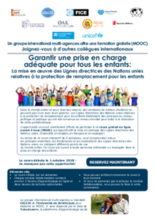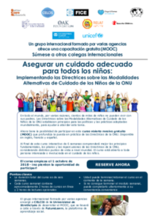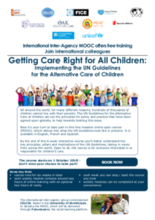Displaying 2041 - 2050 of 4431
This podcast episode from the Faith to Action Initiative features an interview with Peter Kamau, Founding Partner of Child in Family Focus – Kenya, about his experience growing up in an orphanage.
El manual es tanto una hoja de ruta para los responsables de la formulación de políticas como una guía diaria para los profesionales que trabajan con niños y niñas en situación de migración: desde los trabajadores humanitarios y el personal de fronteras hasta los trabajadores sociales responsables de la creación de planes individualizados que pongan a los niños y niñas primero.
This course will help practitioners improve communication skills through techniques which place the child at the heart of the interaction.
Un groupe international multi-agences offre une formation gratuite (MOOC): "Joignez-vous à d’autres collègues internationaux Garantir une prise en charge adéquate pour tous les enfants: La mise en œuvre des Lignes directrices des Nations unies relatives à la protection de remplacement pour les enfants."
Un grupo internacional formado por varias agencias ofrece una capacitación gratuita (MOOC): "Súmese a otros colegas internacionales: Asegurar un cuidado adecuado para todos los niños: Implementando las Directrices sobre las Modalidades Alternativas de Cuidado de los Niños de la ONU."
This free massive online open course (MOOC) delves into what the UN Guidelines for the Alternative Care of Children look like in practice.
Framed around compelling case studies explaining why children are on the move in Africa, the Americas, Asia, Europe, the Middle East and Oceania, this book explores the jurisprudence and processes used by nations to adjudicate children’s protection claims.
The aim of the webinar is to examine how strengthening the social service workforce is an important component of different countries’ national plans of action to address violence against children and the seven strategies outlined in the INSPIRE package.
In this blog post, Traverse Journeys provides a helpful guide for "When Children Sell: Ethical Tips for Travelers."
This blog post highlights groups and organizations that are working to strengthen the social service workforce in order to prevent family separation, including Better Care Network.




